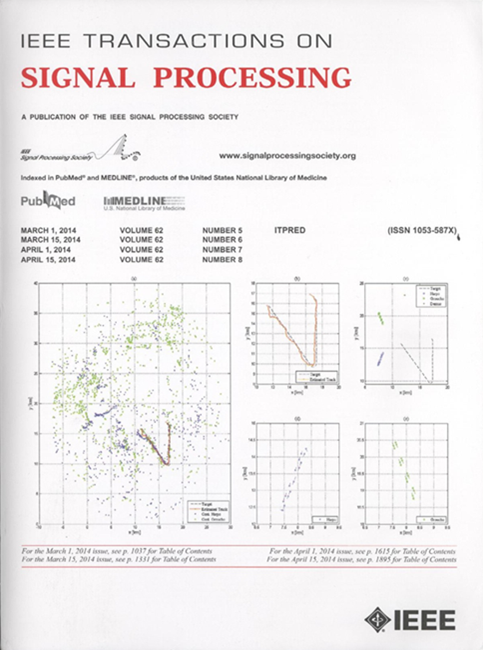A Generalized Approach for Recovering Time Encoded Signals With Finite Rate of Innovation
IF 4.6
2区 工程技术
Q1 ENGINEERING, ELECTRICAL & ELECTRONIC
引用次数: 0
Abstract
In this paper, we consider the problem of reconstructing a function有限创新率下恢复时间编码信号的一种广义方法
在本文中,我们考虑了从直接时间编码机(TEM)测量值重建函数$g(t)$的问题,在这种情况下,信号被表示为在实时点移位的加权一般函数$\varphi(t)$的无穷和。这些函数属于具有有限创新率(FRI)的信号类,它比移位不变或带宽限制空间更普遍,对于这些空间已经引入了恢复保证。对于FRI信号$g(t)$,对特定函数$\varphi(t)$或具有alias抵消特性的函数$\varphi(t)$引入直接TEM样本的恢复保证,从而使$g(t)$具有周期性和带宽限制。在理论方面,这项工作显著增加了保证重构的函数类,并提供了一个完全输入恢复的条件,这取决于$\varphi(t)$的前两个局部导数。我们扩展了这一结果,并在噪声干扰的FRI信号情况下提供了重构保证。在实际应用方面,我们通过使用文献中先前使用的滤波器以及与现有结果不兼容的滤波器进行数值模拟来验证所提出的方法。在滤波器具有未知数学函数且仅被测量的情况下,所提出的方法通过绕过滤波器建模阶段简化了恢复过程。此外,我们使用TEM硬件实现验证了所提出的方法。
本文章由计算机程序翻译,如有差异,请以英文原文为准。
求助全文
约1分钟内获得全文
求助全文
来源期刊

IEEE Transactions on Signal Processing
工程技术-工程:电子与电气
CiteScore
11.20
自引率
9.30%
发文量
310
审稿时长
3.0 months
期刊介绍:
The IEEE Transactions on Signal Processing covers novel theory, algorithms, performance analyses and applications of techniques for the processing, understanding, learning, retrieval, mining, and extraction of information from signals. The term “signal” includes, among others, audio, video, speech, image, communication, geophysical, sonar, radar, medical and musical signals. Examples of topics of interest include, but are not limited to, information processing and the theory and application of filtering, coding, transmitting, estimating, detecting, analyzing, recognizing, synthesizing, recording, and reproducing signals.
 求助内容:
求助内容: 应助结果提醒方式:
应助结果提醒方式:


